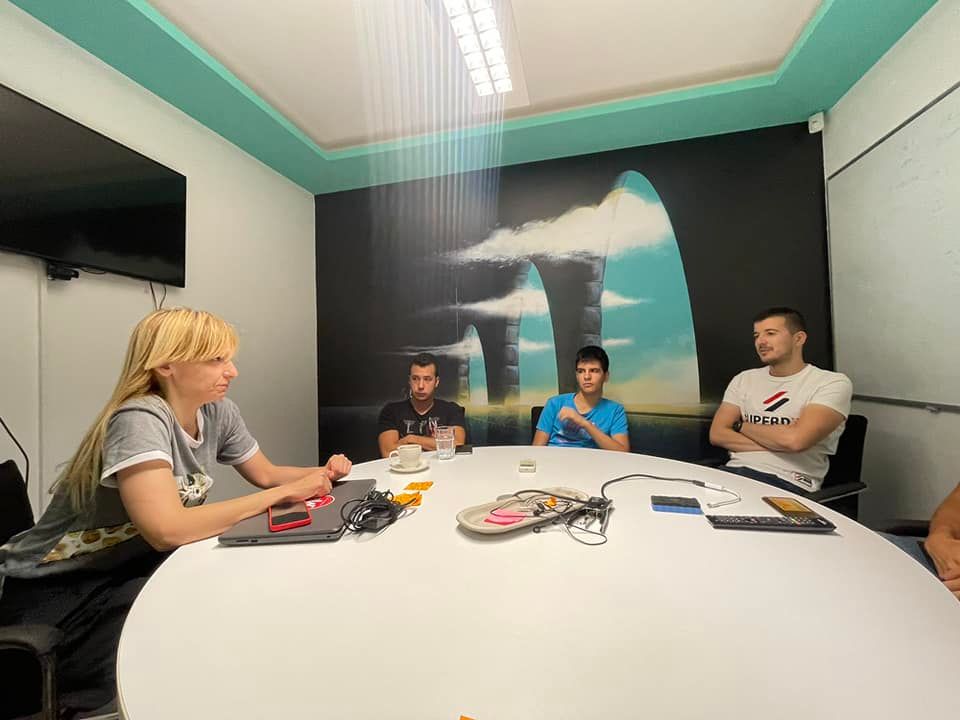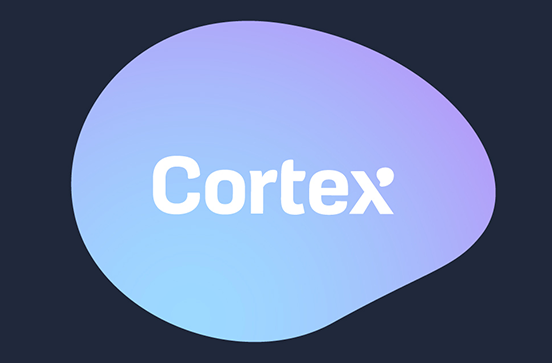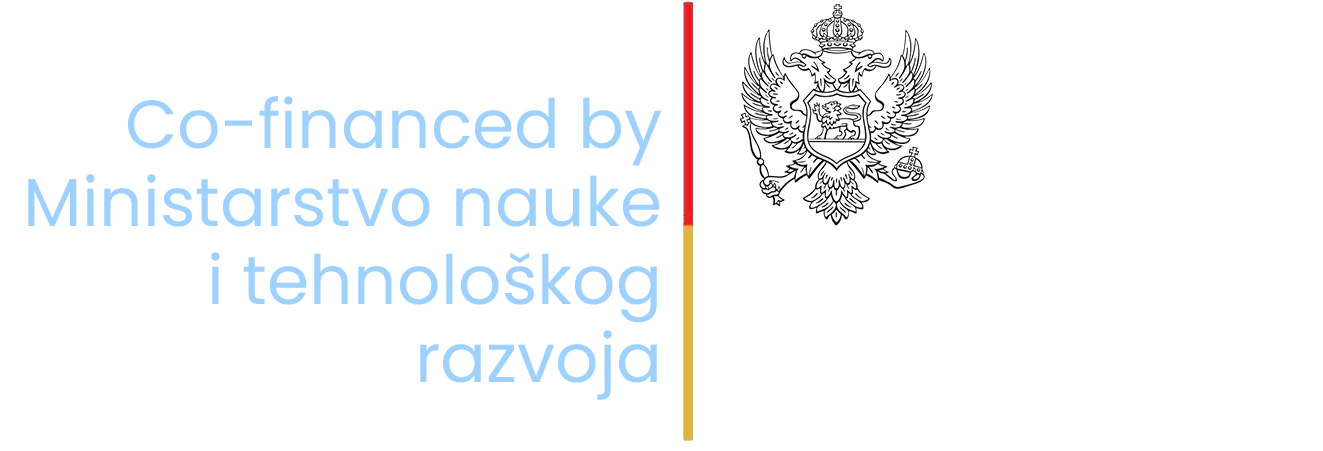The “StepUp with Cortex” project successfully finalized

The “StepUp with Cortex” project, which the ICT Cortex cluster implemented in cooperation with the Capital City of Podgorica, with the support of the Kingdom of Norway through the “Norway for you – Montenegro” project, was closed by marking the final event of the project on November 14, 2022. In the period from March to November of this year, five training programs were implemented, a total of 10 trainers were engaged, and about 100 employees from 12 companies underwent training; employees from the ICT Cortex executive office also successfully completed agile project management training; recommendations were made for improving the business environment for IT companies at the level of the Capital City. The following companies participated in this project: Alicorn, Amplitudo, Archimede, Bild studio, Codepixel, Codeus, Data Design, DigitalBee, Fleka, Logate, Omnitech, and Oykos Development. The final event of the project was attended by training participants, representatives of companies – project users, trainers, and lecturers, as well as representatives of the Capital City and ICT Cortex. The cooperation of the Capital City and ICT Cortex on this project is another confirmation of joint action aimed at improving the overall business environment and creating an innovative ecosystem for IT companies at the level of the Capital City, where conditions are created for the development of innovative products and their placement on international markets.
The “StepUp with Cortex” project of ICT Cortex and the Capital City of Podgorica improved the competitiveness of 12 small IT companies

ICT Cortex, in cooperation with the Capital city of Podgorica, realized the project “StepUp with Cortex”, which was supported by the Kingdom of Norway through the project “Norway for you – Montenegro”. The “StepUp with Cortex” project, which the ICT Cortex cluster implemented in cooperation with the Capital City of Podgorica, with the support of the Kingdom of Norway through the “Norway for you – Montenegro” project, in the period from March to November of this year, was aimed at improving and education of employees from 12 member companies, to improve competitiveness through the upgrading of institutional, administrative and organizational capacities and business skills of employees. The following companies participated in this project: Alicorn, Amplitudo, Archimede, Bild studio, Codepixel, Codeus, Data Design, DigitalBee, Fleka, Logate, Omnitech, and Oykos Development. The final event of the project was organized yesterday, which was attended by training participants, representatives of companies – project beneficiaries, trainers, and lecturers, as well as representatives of the Capital City and ICT Cortex. Chief Project Officer,, Ferida Mandić, emphasized the importance of this project. “The “StepUp with Cortex” project, in the period from March to November of this year, was aimed at the training and education of employees from 12 member companies, to improve competitiveness through upgrading the institutional, administrative, and organizational capacities and business skills of employees.” pointed out Mandić and added that the results of the training were very successful. “Five education programs were implemented, a total of 10 trainers were engaged; about 100 employees from 12 companies underwent training; employees from the ICT Cortex executive office also completed agile project management training; recommendations were made to improve the business environment for IT companies at the level of the Capital City.” Director of the Center for Information System of the Capital City, Džemal Lekić, pointed out that the administration of the Capital City is dedicated to the improvement of the sector of micro, small and medium enterprises, which is one of the key factors for accelerated economic development. “The ICT sector in the capital is recognized as one of the most important sectors for the future economic development of Podgorica because it supports all other sectors of the economy. In recent years, the administration of the Capital City has recognized digitization as one of the priorities in the development of Montenegrin society in terms of processes that can affect the improvement of the quality and standard of life of citizens. The goal is for ICT to become a strong sector of the economy that could become Montenegro’s leading export activity. Through the cooperation of the actors in the ICT community, there will be an increase in the number of employees, primarily professional staff, so the development and application of ICT are of crucial importance for economic development”, stressed Lekić. The project manager of the UNOPS office in Montenegro, Armen Čekić, pointed out that he was particularly glad that the ICT sector recognized the benefits of human resource development. “The development of human resources is the most important for the development of a company, and for the growth of the economy, which also entails the development of technology. So it should be continuously developed. I also hope that the others will follow this approach to their further development”, Čekić concluded. Trainer and NLP coach at NLP Network, Danka Ćetković, expressed her gratitude for the idea of such a project and emphasized that she is very proud of her students. “We hung out and worked together for three months, and at first it wasn’t easy, but over time we realized that the hidden goal was to connect, that we are not competing with each other, but supporting each other. The topics we covered were everyday ones that everyone needs. Especially in the IT sector, because the focus is on professional knowledge, and technological knowledge, to be the best programmers, and designers. That’s how it should be because the ICT industry is the bright spot of our economy. However, for it to be able to deliver everything that is expected, someone must also think about people. Who will develop all that, master it… Because it is an industry that changes very quickly, is very flexible, and prioritizes efficiency, short deadlines, and innovation. So we have to support people, work on their development, communication and negotiation skills, to overcome their fears, nervousness and the like”, described Ćetković. At the very end, participants were presented with certificates and certificates of completed training, where they shared their impressions from the training. A lot of interaction, group work, and exercises, as they said, facilitated the learning process and the acquisition of new skills and knowledge, and they recommend this type of education to people from different spheres because it is of great benefit to everyone. The cooperation of the Capital City and ICT Cortex on this project is another confirmation of joint action aimed at improving the overall business environment and creating an innovative ecosystem for IT companies at the level of the Capital City, where conditions are created for the development of innovative products and their placement on international markets.
High school students started a free internship within the Cortex Academy

Students of Montenegrin secondary vocational schools from Nikšić, Podgorica, Bijelo Polje, and Rožaje who actively attended training in the field of web and mobile application development as part of the Cortex Academy – an education program implemented by the cluster for information technology, innovation, education, design and technological development of Montenegro, have started a free internship in ICT Cortex member companies. As part of the practice, the students were divided into teams, within which nine students from Bijelo Polje and Podgorica, and four from Nikšić were assigned to the field of web application development, while eight students from Podgorica were active in the mobile application development segment. Namely, the students will cooperate with mentors from the companies Coinis, Fleka and Data Design until September, with the aim of improving their skills in the field of web application development, after which the final competition awaits them in September, where the best teams will be awarded. As part of the practical part of the training, participants who opted for the mobile application development segment began an internship at the company Amplitudo, and soon we are expecting the start of education at the honorary member of the ICT Cortex cluster – Crnogorski Telekom. The cooperation with secondary schools from four Montenegrin municipalities is an upgrade of last year’s successful cooperation with ETŠ “Vaso Aligrudić”, which aimed to improve the educational process, with a focus on practical teaching within the direction for the development of web and mobile applications. The participants had the opportunity to work on real projects for 7 weeks, and to create professional work habits through intensive cooperation with mentors from cluster members. We remind you that the Cortex Academy is an education program that includes courses in programming, project management, design, marketing, and software testing. In the previous months, the participants of the pieces of training in the member companies of the cluster, and through the materials available on the online platform, improved their knowledge of some of the most sought-after positions in the ICT market.
Animated Cortex logo – from idea to realization

Visual identity significantly affects the first impression of any organization. Brands that have a carefully designed and standardized visual identity appear more serious, professional, and easy to recognize and remember. Having in mind the mission of our organization, to be the leaders of the digital transformation of Montenegro, and at the same time to be a link with the international market, the task of developing a logo that will be a mark of the Montenegrin IT market, carried a serious dose of responsibility. We decided to use our greatest strength – the synergy effect that comes from connecting the best cluster experts in this field! This time we united the teams of Fleka and Bild studios, which, in addition to daily communication and joint work, created two great solutions. Taking into account the opinions of all founding members of the cluster, in the end, we decided on an animated logo signed by the designer from the ranks of Bild studio – Davor Golubović. In order to bring you as close as possible to the concept of our logo, we will look at each unit separately. Also, below you will have the opportunity to read the experiences of the designers themselves in this creative process. Why Cortex? We wanted to use the name to indicate that we are a connecting point of the members and that our existence protects their interests and strengthens the IT sector. This is why CORTEX – is a membrane of the brain that connects the whole brain and holds information about language, senses, and feelings. When pronouncing, he also draws on CoreTech. 1. Anatomy The ICT Cortex logo consists of two parts that are inseparable, but at the same time well developed even as functionally independent components. Special attention is paid to the typography itself, which is a combination of technology font and human hand. You will notice that the upper part of the Cortex print has a humanistic character, so the finer and more natural ends of the letters are written by hand, while the lower ends are geometric, more stable, and sharper. A strong contrast that is compatible shows that, although different, only together can we make changes. The fluidity of the logo actually represents the life that is constantly in motion, changing and evolving. Let us now pay attention to the other motifs that our logo contains: Lambda The wavelength is marked by the Greek alphabet letter lambda. Apart from the fact that, in addition to frequency, it is a descriptive unit of waves, and thus also brain waves, it has the role of representing the mathematical, precise dimension of the logo. “Thought” As a decorative upper part of the letter “x,” there is a form that draws association to thought. Unlike lambda, it is a product of thinking, and therefore the starting point for creativity and ideas. 2. Flexibility of form The flexibility of the shape creates the added value of the logo. An indefinite form that is constantly changing opens up opportunities for “intentional” forms to achieve a certain emotional reaction (seriousness, playfulness, calmness). Also, the logo dynamic indicates how as a cluster we are actually an organization ready to adapt in line with digital trends. 3. Application The ICT Cortex logo will be animated in 80% of application cases, especially when it comes to digital channels. However, when it comes to traditional channels of communication, such as the media and the press, the logo will be static, but certainly in its well-recognized form and shape. The advantages of the animated logo are that it provides opportunities for experimenting and further creative development. And how did it all look from the designer’s point of view? Miloš, what are the impressions of collaborating with colleagues from Bild, and how much did you all contribute to the synergy effect and elaboration of ideas? “Working with colleagues from the profession, from other companies is always a good opportunity for quality discussions within multidisciplinary teams. Internal company procedures and culture have a great influence on the way we work, so it is always good to have an exchange of expert opinions outside the existing environment, which can often contribute to a better end result. This was also the case here, where the designers were able to give each other constructive criticism in more iterations, to make the final proposals even better. ” Miloš Milošević, CEO & Product Design Lead, Fleka Ksenija, how challenging was it to create a logo like this and how did the whole collaboration with Flek go? “Working with stains? The answer is simple – cooperation has changed the competition and improved the process. Perhaps the best side of the project is that the designers of the two houses that have been working in this field for the last 10+ years have connected, and the fun (for us, the designers) was guaranteed. What I will definitely remember about the project and the collaboration is that at some point I tried to undermine Bild’s solution, since at that time it seemed like “wow, but how” for the given deadlines, to which the designers responded with fire. On Judgment Day in front of the Cortex team, we came out quite satisfied, presenting two diametrical solutions, which, to the satisfaction of the whole team, are signed by Davor Golubović (Bild Studio) and Vuk Bojanić (Fleka) and thus made it difficult for the client to choose. “ Ksenija Planić, Creative Director, Bild Studio Davor, how did you come up with the idea for the animated logo, and what inspired you the most? “The logo was created as a product of thinking about what a brand is in the digital age, the nature of the materials on which it is applied, and the perceptions of the brand through the logo. A logo as a bearer of a brand is a trademark by which the material to which it is applied is branded or, in direct translation. Traditionally, these are physical, static materials such as paper, wood,


